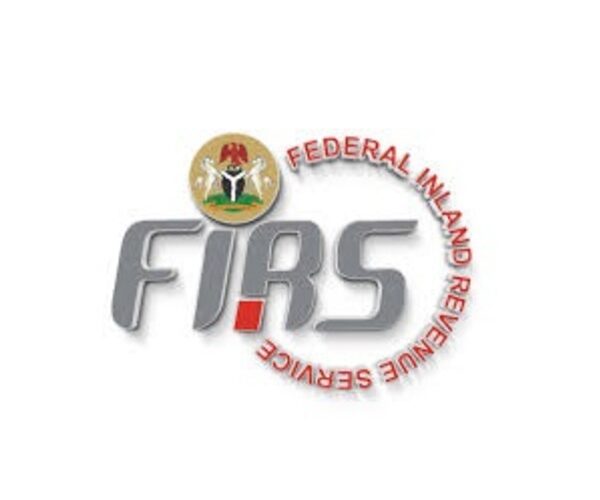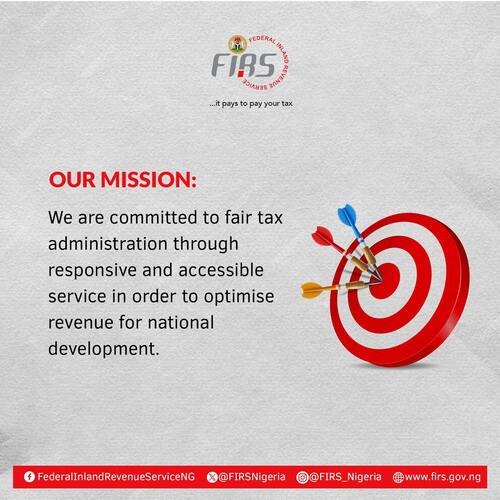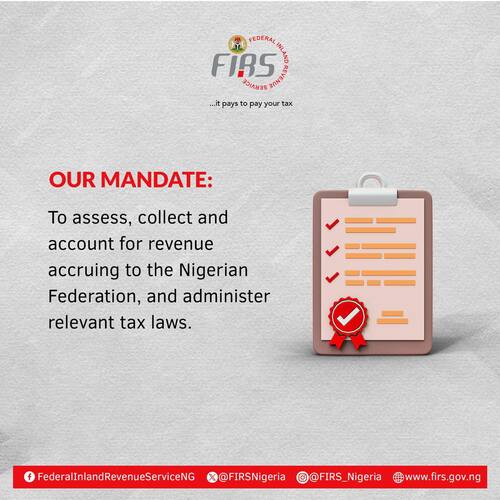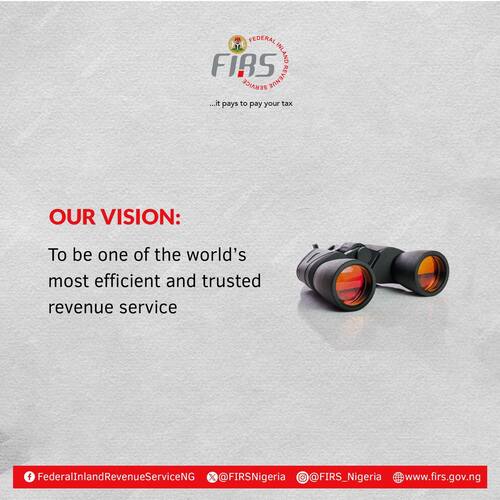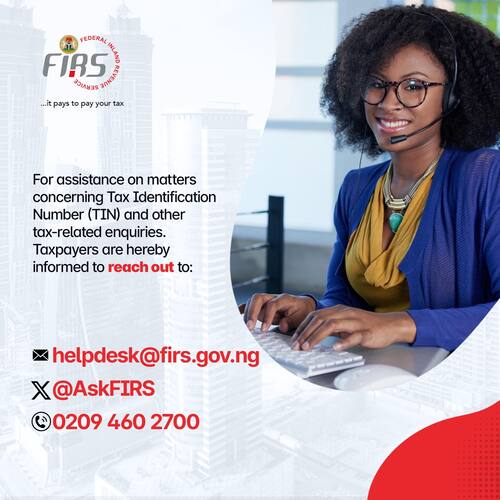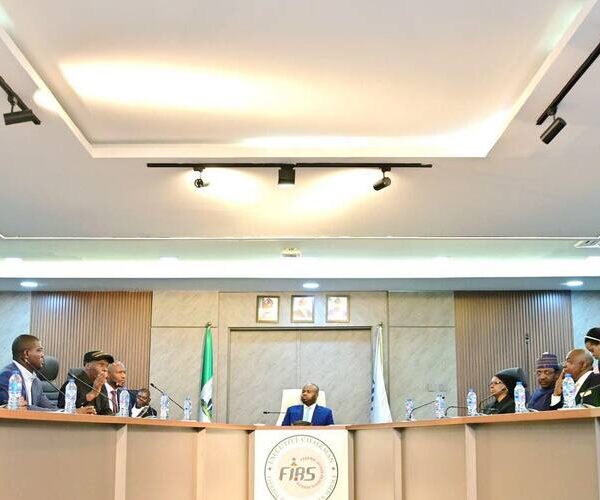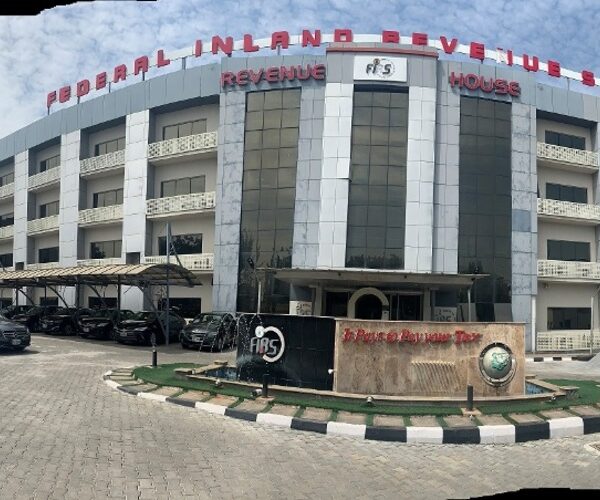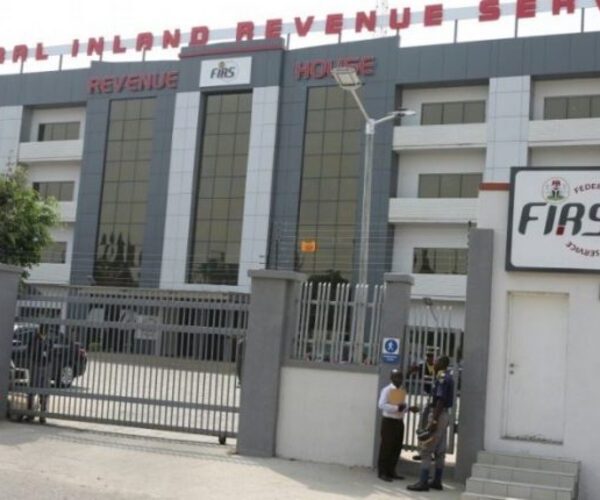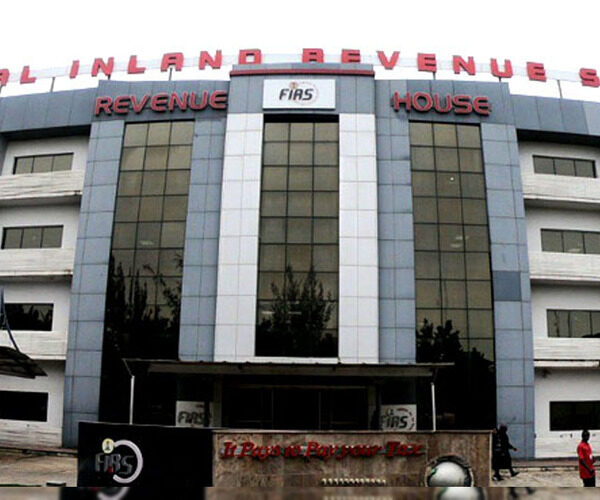- Government Organisation
- 3F83+6FP, Wuse 1, Abuja 904101, Federal Capital Territory, Nigeria
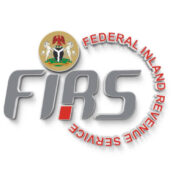
FEDERAL INLAND REVENUE SERVICE (FIRS)
About
The Federal Inland Revenue Service (FIRS) is the agency responsible for assessing, collecting, and accounting for tax and other revenues accruing to the Federal Government of Nigeria.
The Federal Inland Revenue Service (FIRS) stands as the primary tax administration agency in Nigeria, tasked with the responsibility of assessing, collecting, and accounting for taxes and other revenue sources accruing to the Federal Government. Established in 1943, FIRS has evolved into a pivotal institution in Nigeria’s fiscal landscape, playing a crucial role in revenue mobilization, economic development, and nation-building.
Created in 1943, its functions had been performed by the Inland Revenue Department of British West Africa. The Board of Inland Revenue was created in 1958, and the service gained autonomy with the passing of the FIRS (Establishment) Act 13 of 2007.
In 2003, the Federal Government of Nigeria recognized that poor service delivery in the public sector had become an urgent national issue and undertook a series of steps that led to entering into a Service Compact (SERVICOM) with all Nigerians in March 2004.
This was followed by the creation of the SERVICOM office within the Presidency to ensure the entrenchment of excellent service delivery in the public sector in policy, programmes, and practice.
In line with the subsequent Presidential Mandate, the FIRS created a unit in 2014 to institutionalize Service Delivery within the Service. This unit has undergone various transformations to meet the tempo of ever-changing FIRS organizational reforms and the needs of the taxpaying public and stakeholders.
In 2011, FIRS created the Taxpayer Service Department (TPSD) for enhanced focus on taxpayers, as well as the National Taxpayer Advocate position (in 2012) to ensure effective, high-level advocacy for taxpayers.
Evolution
FIRS traces its roots back to the colonial era when it was initially established as the Inland Revenue Department to oversee tax collection in Nigeria. Over the years, the agency underwent several transformations, culminating in the creation of the Federal Inland Revenue Service in 1993 under the Federal Inland Revenue Decree No. 13. This restructuring aimed to streamline tax administration, enhance revenue generation, and improve compliance with tax laws and regulations.
Mandate and Functions
FIRS is mandated to assess, collect, and account for various taxes and levies stipulated under Nigerian tax laws. These include but are not limited to:
- Companies Income Tax (CIT)
- Value Added Tax (VAT)
- Personal Income Tax (PIT)
- Withholding Tax (WHT)
- Capital Gains Tax (CGT)
- Stamp Duties
- Education Tax
- National Information Technology Development Levy (NITDL)
- Petroleum Profit Tax (PPT)
In addition to tax collection, FIRS is responsible for taxpayer education, enforcement of tax laws, and the implementation of tax policies aimed at promoting economic growth, equity, and social welfare.
Revenue Mobilization and Economic Development
FIRS plays a critical role in revenue mobilization, serving as a major source of funding for the Nigerian government’s budgetary expenditures. The revenue generated through taxation supports essential public services, infrastructure development, social programs, and the implementation of government policies aimed at fostering sustainable economic development and poverty alleviation.
Taxpayer Engagement and Compliance
FIRS engages with taxpayers through various channels to enhance compliance with tax laws and regulations. The agency conducts taxpayer education and enlightenment programs, provides taxpayer support services, and implements initiatives to simplify tax processes and procedures. By fostering a culture of voluntary compliance and taxpayer trust, FIRS seeks to broaden the tax base, improve revenue collection efficiency, and mitigate tax evasion and avoidance.
Technological Innovation and Modernization
In recent years, FIRS has embraced technological innovation and modernization to enhance its operational efficiency and effectiveness. The agency has implemented digital platforms for tax registration, filing, and payment, allowing taxpayers to fulfill their obligations conveniently and securely. Additionally, FIRS utilizes data analytics and business intelligence tools to improve tax compliance, identify non-compliant taxpayers, and combat tax evasion and fraud.
Collaboration and Partnerships
FIRS collaborates with other government agencies, international organizations, and stakeholders to strengthen tax administration, exchange best practices, and foster cross-border cooperation in tax matters. The agency also works closely with state revenue authorities and local government councils to harmonize tax policies and streamline revenue collection processes, ensuring synergy and coherence in Nigeria’s tax system.
Organizational Structure/Board
According to the FIRS ACT, the organizational structure of FIRS consists of
- Executive Chairman
- Nine members with relevant qualifications and expertise appointed by the President to represent each of the 9 geo-political zones
- A representative of the Attorney-General of the Federation
- The Governor of the Central Bank of Nigeria or his representative
- A representative of the Minister of Finance not below the rank of a Director
- The Chairman of the Revenue Mobilization, Allocation and Fiscal Commission
- The Group Managing Director of the Nigerian National Petroleum Corporation
- The Comptroller-General of the Nigeria Customs Service or his representative, not below the rank of Deputy Comptroller-General
- The Registrar-General of the Corporate Affairs Commission or his representative
- The Chief Executive Officer of the National Planning Commission or his representative
- President Muhammadu Buhari appointed Muhammad Mamman Nami as the new Executive Chairman of FIRS. He replaces Babatunde Fowler.
Statutorily and administratively, the FIRS has the responsibility for the assessment, collection, and accounting of taxes to the Government:
- The timely provision and publication of accurate data and annual reports to the Federal Government of Nigeria and other stakeholders to inform national economic planning, academic research, tax policy, and development legislation
- The timely provision of tax advisory services, rulings, guidance notes, and clarifications on request and to the public in general
- The regular investigation, enforcement, and prosecution of tax defaulters as provided by the law
- The issuance of “Taxpayer Identification Number” (TIN) at no cost to the taxpayer
- The prompt processing of payment claims and tax refund requests received, within stated timeframes
- Undertake appropriate actions to reduce the arrears position of the service and minimize the debt profile
- The regular and accurate reconciliation of taxes received into Federation, Consolidated, and VAT the case may be
- Provision of tax education & information to taxpayers through diverse channels and languages.
Business Amenities
- Car Parking
- Funding: Federal
Contact Information
Opening Hours
Contact Business
Contact Business
Additional Information
Additional info



